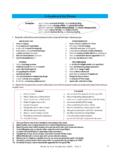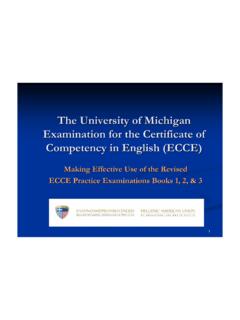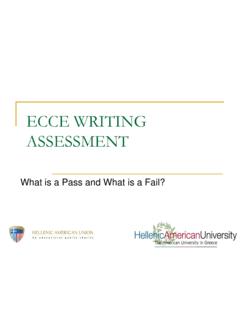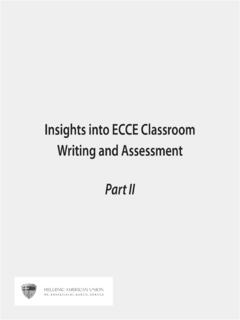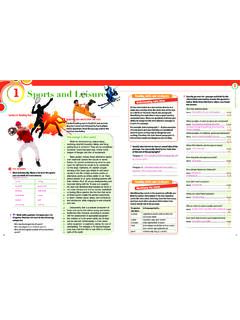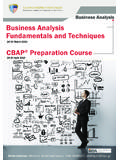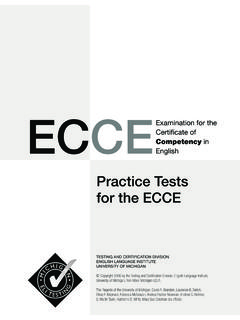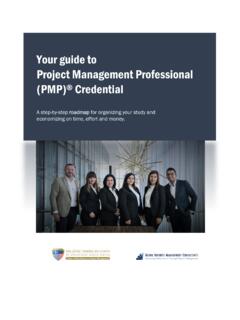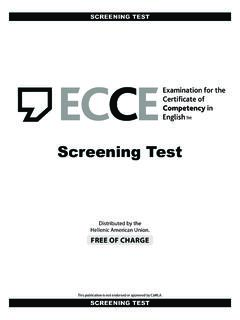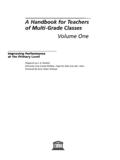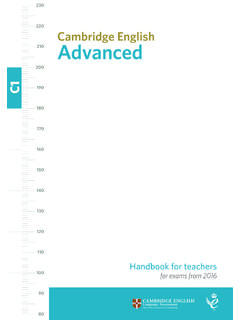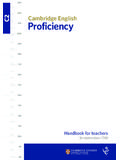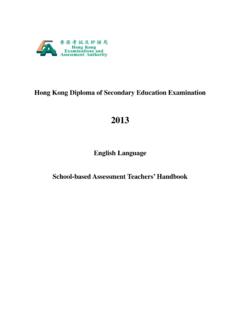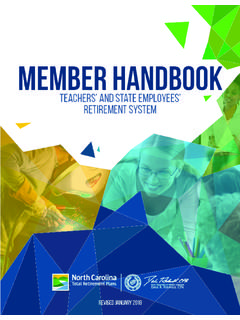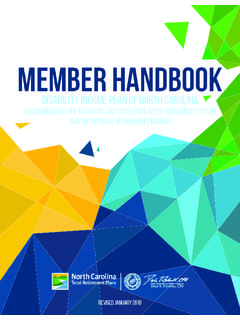Transcription of ECCE Writing Handbook for Teachers - A non-profit ...
1 ecce Writing Handbook for Teachers We would like to thank the following faculty for contributing materials and their expertise. Anastasia Diamantopoulou, Nigel Downey, Cathy Georgopoulou, Spiros Hadjipetros, Voula Kanistra, Marianna Katsaounou, Charalambos Kollias, Yanna Makris, Michael Robbs, Alexandra Tsakogiannis, Lyn Waldie WHY USE THE ecce Writing Handbook FOR Teachers ? Teaching Writing can be challenging for all Teachers . It is a complex decision-making process involving careful selection of the appropriate prompt, devising ways to help students think about a topic, and providing a relevant language focus. Assessing students' Writing and supplying useful feedback also requires informed decisions about the level of competence necessary for meaningful communication in Writing and finally the nature of the feedback provided for the students.
2 What do Teachers need to know to help students develop effective Writing skills for a specific Writing task? a thorough understanding of the task itself: purpose and audience ideas to help students plan a task understanding the components of well-organized Writing introduction and conclusion thesis statement topic sentences insights on appropriate rhetorical organization knowledge of the topic and topic-related vocabulary cohesion in texts: understanding the use of linking words understanding of different types of sentence structure linking of sentences paragraph development how to respond to students' Writing awareness of LI interference informed judgments about what to correct and how to correct Finally, Teachers should be familiar with the scoring rubrics of standardized tests and use modified versions of the rubrics for assessing their students' Writing to provide them with effective feedback.
3 Acquiring all this knowledge to teach Writing requires a great deal of practice on the part of the teacher to understand features of effective communication, and to use the appropriate classroom procedures that will help students develop the skills they need for any examination Writing task. We therefore hope that the materials that we have developed in collaboration with experienced Teachers at the Hellenic American Union will contribute to other Teachers ' awareness of the following components of the ecce tasks: role of the ecce Writing prompts as a stimulus for Writing ; organization of the content for the two tasks;. feedback on errors and assessment of the students' performance. HOW TO USE THE teacher 'S Handbook FOR ecce Writing . The Handbook is intended solely for Teachers although some of the ideas in the activities may be used for students.
4 Each section focuses on different elements of the Writing task. Teachers may work on specific sections from anywhere in the book or begin with the first section and gradually work their way through all the sections. It is intended primarily for self study, but can also be used by teacher trainers for methodology sessions on the teaching of Writing . A key is provided for all the activities at the end of the book. At the beginning of each section there is an explanation of why Teachers need to focus on specific elements of the Writing task, followed by a demonstration activity which raises Teachers ' awareness of specific features of each of the elements. The teacher is then given the opportunity to practice analyzing prompts, preparing outlines for letters and essays, identifying errors from samples of students' Writing and finally assessing the level of Writing competence using teacher versions of the ecce scoring rubrics.
5 As we know, students need practice to improve their Writing , but Teachers also need practice in the skills that we expect our students to develop. These materials therefore not only help Teachers with ideas for classroom practice, but also assist them in becoming good writers themselves. Teachers with good Writing skills are more likely to be effective Writing Teachers . Equally important however is that these Teachers will be able to participate in other professional and academic communities where effective communication in Writing is highly valued. This will benefit Teachers who wish to develop materials, present at conferences, engage in further studies or take on administrative responsibilities. We hope you will find this book useful and that it will be a valuable aid in planning, teaching and giving feedback on Writing .
6 We also hope that it will provide a focus for you to reflect on your own Writing skills, helping you to become successful participants of the professional and academic communities related to the field of language teaching. Christine Irvine Niakaris Director of the Center for Applied Linguistics and Language Studies Hellenic American Union Hellenic American Union 2007 3. Table of Contents Title Page Selecting the Appropriate Stimulus and Prompt 5. Understanding the Stimulus and Prompt 9. Understanding the Process of Brainstorming and Outlining 12. Organizing Writing 17 Achieving Cohesion 24. Giving Feedback on Content, Development and Organization 27. Giving Feedback on Language Errors 29. Evaluating Students' Writing 33. Key to Over to You Activities (Suggested Answers) 38.
7 Selecting the Appropriate Stimulus and Prompt 38. Understanding the Stimulus and Prompt 39. Understanding the Process of Brainstorming and Outlining 40 Organizing Writing 43 Achieving Cohesion 46. Giving Feedback on Content, Development and Organization 47 Giving Feedback on Language Errors 48. Evaluating Students' Writing 50 4 Hellenic American Union 2007. ecce Writing Handbook for Teachers Selecting the Appropriate Stimulus and Prompt INTRODUCTION. Clear, well-organized and fully developed letters and essays depend on carefully selected, well-formulated stimuli and prompts. This will give the learner confidence and a sense of direction. Occasionally, course books have inappropriate stimuli and prompts and it is important for the teacher to be able to recognize them.
8 An appropriate stimulus for the ecce (B2) level is a topic related to issues of general interest. The language level should be low-intermediate slightly below the level of the student - so that it is accessible to the students. A good stimulus should not be unnecessarily long because it may cause confusion and detract the students' attention from the main focus. It should not be extremely short either because it won't provide students with enough information and guidelines to help them develop their letter or essay. The stimulus should reflect real life that activates background knowledge, often an excerpt from a newspaper or magazine. The prompts should be realistic and related to the stimulus. The letter task should specify who is Writing , to whom and for what purpose, and it should address the main question which is stated or implied in the stimulus.
9 The essay task should not be too general or too rigid and it should also be related to the stimulus. An example of appropriate stimulus & prompts CANCELLATION OF CLASS TRIP. The Newtown High School senior class trip was cancelled by the school principal. What led to the cancellation was the negative publicity another school trip received. The improper behavior of some students on that trip raised questions about student safety, proper supervision and the usefulness of such trips. A representative of the senior class wrote a letter to the Newtown Times to insist that the trip should still take place. The editor of the Newtown Times would like to know how its readers feel about the trip cancellation. Task 1: Letter Do you agree with the principal's decision, or do you think the trip should still take place?
10 Write a letter to the editor explaining your view. Discuss this issue making specific references to student behavior, supervision, and the usefulness of the trip. Start your letter, Dear Editor, . Task 2: Essay Do you think school trips should be educational or recreational? Explain what can contribute to their success and how safety and proper behavior can be promoted. Provide specific reasons and examples to support your opinion. GUIDELINES TO SELECTING APPROPRIATE STIMULI AND PROMPTS. WITH SAMPLE ACTIVITIES. The following questions are based on the criteria for choosing appropriate stimuli and prompts. These can be used as a guide to help Teachers / students choose good prompts and stimuli. Selecting the Right Stimuli & Prompts Criteria Checklist Is the language at the lower-intermediate level?
